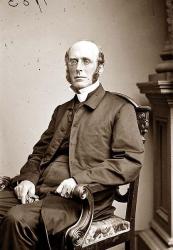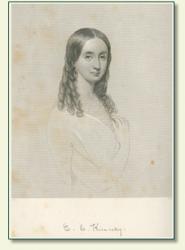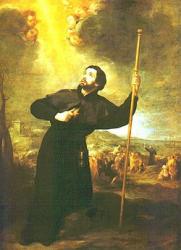Planning worship?
Check out our sister site, ZeteoSearch.org,
for 20+ additional resources related to your search.
- |
User Links
Person Results
‹ Return to hymnal




Export as CSV
James G. Small
1817 - 1888 Person Name: J. G. Small Hymnal Number: d250 Author of "I've found a Friend, O, such a Friend" in Gospel Hymns Small, James Grindly, son of George Small, J.P. of Edinburgh, was born in that city in 1817. He was educated at the High School, and the University of Edinburgh. He studied divinity under Dr. Chalmers, and in 1843 he joined the Free Church of Scotland. In 1847 he became the minister of the Free Church at Bervie, near Montrose. He died at Renfrew, Feb. 11, 1888. His poetical works were (1l) The Highlands and other Poems, 1843, 3rd ed. 1852; (2) Songs of the Vineyard in Days of Gloom and Sadness, 1846 ; (3) Hymns for Youthful Voices, 1859; (4) Psalms and Sacred Songs, 1866. His well-known hymn "I've found a Friend; oh such a Friend" (Jesus, the Friend), appeared in his Psalms & Sacred Songs, 1866. It is found in I. D. Sankey's Sacred Songs and Solos, 1878, and others.
--John Julian, Dictionary of Hymnology, Appendix, Part II (1907)
James G. Small
Jonathan Evans
1748 - 1809 Hymnal Number: d162 Author of "Hark, the voice of love and mercy" in Gospel Hymns Evans, Jonathan, born at Coventry in 1748 or 1749. He was the son of a working man, and as a youth was employed in a ribbon manufactory. About 1778 he joined the congregation at Coventry, over which the Rev. G. Burder was pastor. He began preaching at Foleshill, near Coventry, in 1782, and in 1795 he began his stated ministry there, retaining the same to his death on Aug. 31, 1809. Two biographical notices of him appeared in the Evangelical Magazine (Oct. 1809, and March 1847), and also several of his hymns. Two of his hymns appeared in Burder's Collection, 1784, and another in the 2nd edition the same year. His best known hymns are, "Come, Thou soul-transforming Spirit,” and "Hark! the voice of love and mercy;" q.v. He published no poetical work or collection of hymns.
-- John Julian, Dictionary of Hymnology (1907)
Jonathan Evans
Anna Shipton
1815 - 1901 Hymnal Number: d66 Author of "Call them in, the poor, the wretched" in Gospel Hymns Anna Savage Shipton United Kingdom 1815-1901. Born at Evesham, Wychavon, Worcester, England, she was the daughter of Evesham solicitor, Edward Savage. She inherited land from her father when he died in 1839 (her mother had died in 1817, and her brother had emigrated to Australia), and rented out some of the land. She married Joseph Shipton in 1848, but separated in 1852, allegedly due to his infidelity. Her estranged husband died in 1860. She traveled extensively and continued writing poetry and essays. She wrote 20+ religious books, and many leaflets, mostly religious. Among her books the following: a hymns and meditations book entitled, “Whispers in the palms. Hymns and meditations” (1855); Precious gems for the Savior’s diadems” (1862); “The brook in the way-original hymns” (1864); “Tell Jesus- Recollections of E Gosse”; “The cottage on the hock-an allegory”. After living in mainland Europe from the mid-1860s to the 1880s, she returned to the UK and settled in Sussex, then in St Leonard’s on the Sea, East Sussex, England, where she eventually died.
John Perry
===================
Shipton, Anna. Concerning this writer we can ascertain no details beyond the fact that she published:—
(1) Whispers in the Palms. Hymns and Meditations. London, W. Yapp, 1855; second edition, augmented, 1857. (2) Precious Gems for the Saviour's Diadem, 1862. (3) The Brook in the Way; Original Hymns, 1864. (4) Tell Jesus: Recollections of E. Gosse. (5) The Cottage on The Hock, an Allegory. Also other smaller books.
Her hymns in common use include:—
i. From her Whispers in the Palms, 1855-57.
1. Down in the pleasant pastures. The Good Shepherd.
2. Father, My cup is full. Gethsemane.
3. How shall I praise Thee, O my God? Praise.
4. Jesus, Master, hear my cry. Blind Bartimaeus.
ii. From her other Works.
5. Call them in, the poor,the wretched (1862). Home Missions.
6. Praise God, ye gladdening smiles of mom. Ps. cxlviii.
-- John Julian, Dictionary of Hymnology (1907)
Anna Shipton
John Rippon

1751 - 1836 Hymnal Number: d14 Author of "All hail the power of Jesus' name, Let angels prostrate fall" in Gospel Hymns Rippon, John, D.D., was born at Tiverton, Devon, April 29, 1751, and was educated for the ministry at the Baptist College, Bristol. In 1773 he became Pastor of the Baptist church in Carter Lane, Tooley Street (afterwards removed to New Park Street), London, and over this church he continued to preside until his death, on Dec. 17, 1836. The degree of D.D. was conferred on him in 1792 by the Baptist College, Providence, Rhode Island. Dr. Rippon was one of the most popular and influential Dissenting ministers of his time. From 1790 to 1802 he issued the Baptist Annual Register, a periodical containing an account of the most important events in the history of the Baptist Denomination in Great Britain and America during that period, and very valuable now as a book of reference. But his most famous work is his Selection of hymns for public worship, which appeared in 1787. The full title of the first edition is A selection of Hymns from the best authors, intended as an Appendix to Dr. Watts's Psalms and Hymns. In 1791 he published a Selection of Psalm and Hymn Tunes from the Best Authors, adapted to Dr. Watts's Psalms and Hymns, and to his own Selection, and from that time the names of tunes were prefixed to the hymns in the successive editions of his hymn-book. In 1800 he published the 10th ed. of his Selections, containing more than sixty additional hymns.
In 1827 it was still further enlarged, and in 1844, after his death, appeared The Comprehensive Edition, commonly known as The Comprehensive Rippon, containing most of the additional hymns, with about 400 then first added, making in all upwards of 1170, in 100 metres. A rival to the Comprehensive was also afterwards published under the old title, somewhat enlarged. In the preparation of the original book, and its subsequent improvement, Dr. Rippon performed an important service to Baptist Hymnody, and also, it is said, gained for himself "an estate" through its immense sale. In the preface to the tenth edition lie claims for himself the authorship of some of the hymns, but as he refrained from affixing his name to any of the hymns it is impossible now to say with certainty which ought to be ascribed to him. There can, however, be no reasonable doubt that hymn 535, 3rd part, "The day has dawned, Jehovah comes" (q.v.), is one of his compositions. Other hymns, probably by him, are, "Amid the splendours of Thy state" (Love of God), 1800; and "There is joy in heaven, and joy on earth" (Joy over the Repenting Sinner), 1787. He also altered the texts of and made additions to several of the older hymns. Some of these altered texts are still in common use. In 1830 the additions given in the 27th ed., 1827, of Rippon's Selections were reprinted, with notes by Dr. Slater, as:—
Hymns Original and Selected; interspersed in the Twenty-seventh edition of the Selection, with Numerous Doxologies, in the Usual, the Peculiar, and in the less Common metres. By John Rippon, D.D.
A second edition of this pamphlet of 82 hymns and doxologies appeared in 1832. [Rev. W. R. Stevenson, M.A.]
--John Julian, Dictionary of Hymnology (1907)
John Rippon
Lucy E. Akerman
1816 - 1874 Person Name: Lucy Evelina Akerman Hymnal Number: d359 Author of "Nothing but leaves the spirit grieves" in Gospel Hymns Akerman, Lucy Evelina, née Metcalf. An American Unitarian writer, daughter of Thomas Metcalf, born at Wrentham, Mass., Feb. 21, 1816, married to Charles Akerman, of Portsmouth, N.H, resided at Providence, R.I., and died there Feb. 21,1874. Mrs. Akerman is known as a hymn writer through her:—
Nothing but leaves, the Spirit grieves, which was suggested by a sermon by M. D. Conway, and first published in the N. Y. Christian Observer, cir. 1858. In the Scottish Family Treasury, 1859, p. 136, it is given without name or signature, and was thus introduced into Great Britain. In America it is chiefly in use amongst the Baptists. Its popularity in Great Britain arose out of its incorporation by Mr. Sankey, in his Sacred Songs & Solos, No. 34, and his rendering of it in the evangelistic services of Mr. Moody. The air to which it is sung is by an American composer, S. J. Vail.
--John Julian, Dictionary of Hymnology (1907)
Lucy E. Akerman
Samuel Christian Gottfried Küster
1762 - 1838 Person Name: S. C. G. Kuester Hymnal Number: d389 Author of "O Jesus, friend unfailing" in Gospel Hymns Küster, Samuel Christian Gottfried, son of S. C. K. Küster, inspector and chief pastor at Havelberg, Brandenburg, was born at Havelberg, Aug. 18, 1762. After studying at the University of Berlin (D.D. 1835) he became third pastor of the Friedrich-Werder Church at Berlin, in 1786; in 1793 second pastor; and in 1797 chief pastor and superintendent, on the death of his father (who had been called to this church in 1771). He died at Eberswalde (Neustadt-E.), near Berlin, Aug. 22, 1838 ( Allg. Deutsche Biographie, xvi. 439, &c:
He was one of the editors of the Berlin Gesang-Buch , 1829, and contributed to it two hymns, Nos. 294 and 549; and in 1831 published a small volume of Kurze lebensgeschichtliche Nachrichten regarding the authors of the hymns therein contained.
One of Küster's hymns has passed into English, viz:—
0 Jesu, Freund der Seelen. Love to Christ, 1829, as above, No. 549, in 6 stanzas of 8 lines. Suggested by the "Schatz über alle Schatze" [see Liscovius]. Translated as:—
0 Jesus, Friend unfailing. A good and full translation by Miss Burlingham, written June 13,1865, and first published in the British Herald, July, 1865, p. 100. Repeated in full in Reid's Praise Book, 1872; W. F. Stevenson's Hymns for Church & Home, 1873; Dale's English Hymn Book, 1875, and others; and abridged in Newman Hall's Christ Church Hymnal, 1876; Baptist Hymnal, 1879; Supplement of 1880 to Baptist Psalms & Hymns, 1858, &c. [Rev. James Mearns, M.A.]
--John Julian, Dictionary of Hymnology (1907)
Samuel Christian Gottfried Küster
J. Williams

1817 - 1899 Person Name: John Williams Hymnal Number: d218 Author of "I know that my Redeemer lives, this thought" in Gospel Hymns John Williams was born at Deerfield, Mass., in 1817; graduated at Trinity College, Hartford, in 1835; was ordained Deacon, 1838; Priest, 1841; Rector of S. George's, Schenectady, N.Y., 1842; President of Trinity College, 1848-1853; Assistant Bishop of Connecticut, 1851, and sole Bishop, by the death of Bishop Brownell, in 1865. He has edited a number of works of value.
--Annotations of the Hymnal, Charles Hutchins, M.A. 1872.
================
Williams, John, D.D., LL.D., was born at Deerfield, Massachusetts, Aug. 30, 1817; graduated at Trinity College, 1835, and was ordained in 1838. From 1842 to 1848 he was Rector at Schenectady, New York, and President of Trinity College, Hartford, Connecticut, from 1848 to 1853. In 1861 he was consecrated Assistant Bishop of Connecticut, taking, in 1865, the full charge of that diocese. Bishop Williams is an eminent scholar. His contributions to hymnology were Ancient Hymns of Holy Church , Hartford, 1845, being translations from the Latin; the "Additional Hymns," pp. 81-127, were selected from the translations from the Latin by Isaac Williams. A few of Bishop Williams's translations have come into common use.
-- John Julian, Dictionary of Hymnology (1907)
J. Williams
Elizabeth C. Kinney

1810 - 1889 Hymnal Number: d270 Author of "Pass not by" in Gospel Hymns Kinney, Elizabeth Clementine, née Dodge, born at New York, Dec. 18, 1810, and married first to E. C. Stedman, and second to W. B. Kinney. Her hymn "Jesus, Saviour, pass not by" (Salvation desired), appeared in the Songs of Christian Praise, N. Y., 1880. Died in 1889.
--John Julian, Dictionary of Hymnology, Appendix, Part II (1907)
=====================
Granddaughter of colonial poet Aaron Cleveland, poet and essayist Elizabeth Kinney grew up in New York City. After her short first marriage, which left her widowed with one child at the age of twenty-five, she began to publish her articles and poetry in popular literary magazines such as Graham's, Sartain's, and the Knickerbocker. In 1841 she married publicist and writer William Kinney of New Jersey, and became a regular contributor to the Newark Daily Advisor when he took an editorial position there.
In 1850 William Kinney received an assignment in Sardinia, and for four years the Kinneys resided among the literati of Turin. When his post expired, they moved to Florence, where the Anglophone community included writers Robert and Elizabeth Barrett Browning, Alfred, Lord Tennyson, and Anthony Trollope. Here Elizabeth Kinney composed her metrical Italian romance Felicità before returning to Newark in 1865.
The lively, romantic tones of her writing met with critical and popular success, and Elizabeth Kinney's work continued to appear in periodicals on both sides of the Atlantic. She published a full volume of poetry (Poems) in 1867.
http://www.librarycompany.org/women/portraits/
Elizabeth C. Kinney
Saint Francis Xavier

1506 - 1552 Person Name: Francis Xavier Hymnal Number: d220 Author of "I love thee, O my God [Lord], but not" in Gospel Hymns St. Francis Xavier, the great missionary saint of the Roman Catholic Church, was the son of Don John Giasso and Donna Maria d'Azpilqueta y Xavier; he was born at the castle Xavier, near Pampeluna, Spain, on April 7, 1506, and is known to history by his mother's name. At the age of eighteen he entered the University of Paris, where in due course he graduated, and then devoted himself to teaching. It was here that he became acquainted with Ignatius Loyola the founder of the Jesuits, who was then planning the colossal work which he afterwards accomplished. Xavier became one of the first nine of Loyola's converts, and the most enthusiastic of the little band. The date of the formation of the Order of the Jesuits is given as Aug. 15, 1534, and the place as Montmartre near Paris. We find Xavier at Venice with Loyola in 1537, where the visitation of a hospital for incurables was assigned to him. Here in the discharge of his duties he gave early evidence of his enthusiasm and self-devotion.
He subsequently visited Rome, where with Loyola and others of the Order he was brought, through the influence of the Rector of the University of Paris, who was then at Rome, to the notice of John III. of Portugal, who desired some of them for mission work in India. Circumstances led to the selection of Xavier for the work. He left Rome in March 1540, and set sail on April 7, 1541, for Goa, the chief city of the Portuguese possessions, where he arrived on May 6, 1542. From that time to the day of his death at Sancian, near Canton, on Dec. 22, 1552, he devoted himself to his work in a most heroic and devoted manner, visiting Travancore, Ceylon, Malacca, Japan, and other heathen lands with Cross in hand, and a burning zeal in his heart. Xavier's life has been written by many hands. The roll of deeds which he is said to have done, and the miracles he is said to have wrought, even to the raising of the dead, is long, but many of the alleged facts are open to the gravest doubt, and others are beyond belief. The hymns which are associated with Xavier's name are, "O Deus ego amo Te, Nam prior Tu amasti me," and "O Deus ego amo Te, Nee amo Te ut salves me.” That the first was written by him is most improbable, the evidence in his favour being absolutely nil. The second may possibly be his (see as above), it breathes his abnegation of self in every word, his spirit in every line. See Murray's Magazine for Oct. 1890, for an interesting account of Goa and its Cathedral, where Xavier lies buried.
--John Julian, Dictionary of Hymnology (1907)
==============
See also in:
Hymn Writers of the Church
Saint Francis Xavier


 My Starred Hymns
My Starred Hymns


